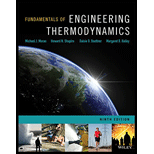
Fundamentals Of Engineering Thermodynamics, 9e
9th Edition
ISBN: 9781119391432
Author: MORAN
Publisher: WILEY
expand_more
expand_more
format_list_bulleted
Question
error_outline
This textbook solution is under construction.
Students have asked these similar questions
Consider the bar, shown in Figure 1 that undergoes axial displacement due to both a distributed load
and a point force. The bar is of cross-sectional area A = 1.10-3 m², and has a modulus of elasticity
E = 100 GPa.
1(x) = 5 kN/m
x=0.0
x=2.0
2.0m
10 kN
Figure 1: Bar domain with varying distributed forces.
a) The general form of the governing equations describing the bar's displacement, u(x), is given by,
d
(AE du(x))
-) +1(x) = 0.
d.x
dx
What are the accompanying boundary conditions for this bar?
b) Using the mesh in Figure 2, form the basis functions associated with element 2 and write the FEM
approximation over the element.
1
2
3
1
2
1m
1m
Figure 2: Mesh of 2 elements. Elements are numbered with underlines.
c) The general form of the element stiffness matrix system, with nodes indexed by i and j, is,
AE
Uj
N;(x)l(x)dx
– Ng(0)f(0)
¥ [4]}]{{}}={{{}\(\\+} + {N(2)f(2) = N (0)5() },
(1)
0, respectively.
L
=
(2)
where f(2) and f(0) denote the boundary forces at positions x 2 and x
Evaluate…
answer please
amination)
Question 1
Consider the bar, shown in Figure 1, that undergoes axial displacement due to both a distributed load
and a point force. The bar is of cross-sectional area A = 1.103 m2, and has a modulus of elasticity
E = 100 GPa.
1(x) = 5 kN/m
10 kN
X
x=0.0
x=2.0
2.0m
Figure 1: Bar domain with varying distributed forces.
a) The general form of the governing equations describing the bar's displacement, u(x), is given by,
d
(AE du(x)) + 1(x) = 0.
dx
dx
What are the accompanying boundary conditions for this bar?
MacBook Air
a
会
DII
F5
F6
F7
F8
80
F3
F4
0/
20
[8 marksl
8
FO
Knowledge Booster
Similar questions
- show workingarrow_forwardCFD help Figure 3: Advection equation, solution for three different timesteps. Q1) Provide an explanation what conditions and numerical setup could explain the curves. Identify which of the three curves is the first, second and third timestep.arrow_forwardanswer pleasearrow_forward
- Figure 3 shows the numerical solution of the advection equation for a scalar u along x at three consecutive timesteps. 1.0 0.8- 0.6 0.4- 0.2 0.0 00 -0.2 -0.4 -0.6- 3.0 3.5 4.0 4.5 5.0 5.5 6.0 6.5 Figure 3: Advection equation, solution for three different timesteps.arrow_forwardQuestion 2 Figure 3 shows the numerical solution of the advection equation for a scalar u along x at three consecutive timesteps. 1.0 0.8- 0.6- 0.4- 0.2- 0.0- -0.2- -0.4- -0.6 3.0 3.5 4.0 4.5 5.0 5.5 6.0 6.5 Figure 3: Advection equation, solution for three different timesteps. a) Provide an explanation what conditions and numerical setup could explain the curves. Identify which of the three curves is the first, second and third timestep. b) Consider explicit schemes with central and upwind discretisations. Explain how each of these candidate discretisations could produce the behaviour shown in Figure 3. c) Determine the CFL number that was used in the simulation for each of the candidate schemes for all possible updates. Assume that the timestep and mesh-width used are constant. Read the data to two digits of accuracy from Figure 4 shown at the end of the question, which is an enlarged version of Figure 3. Demonstrate your method and input data for one calculation, but then use a…arrow_forwardanswer pleasearrow_forward
- Provide an explanation what conditions and numerical setup could explain the curves. Identify which of the three curves is the first. second and third timestep.arrow_forwardWhat are the accompanving boundary conditions for this bar?arrow_forward1.1 Consider the fireclay brick wall of Example 1.1 that is operating under different thermal conditions. The tem- perature distribution, at an instant in time, is T(x) = a+ bx where a 1400 K and b = -1000 K/m. Determine the heat fluxes, q", and heat rates, q, at x = 0 and x = L. Do steady-state conditions exist?arrow_forward
arrow_back_ios
SEE MORE QUESTIONS
arrow_forward_ios
Recommended textbooks for you
 Refrigeration and Air Conditioning Technology (Mi...Mechanical EngineeringISBN:9781305578296Author:John Tomczyk, Eugene Silberstein, Bill Whitman, Bill JohnsonPublisher:Cengage Learning
Refrigeration and Air Conditioning Technology (Mi...Mechanical EngineeringISBN:9781305578296Author:John Tomczyk, Eugene Silberstein, Bill Whitman, Bill JohnsonPublisher:Cengage Learning Principles of Heat Transfer (Activate Learning wi...Mechanical EngineeringISBN:9781305387102Author:Kreith, Frank; Manglik, Raj M.Publisher:Cengage Learning
Principles of Heat Transfer (Activate Learning wi...Mechanical EngineeringISBN:9781305387102Author:Kreith, Frank; Manglik, Raj M.Publisher:Cengage Learning

Refrigeration and Air Conditioning Technology (Mi...
Mechanical Engineering
ISBN:9781305578296
Author:John Tomczyk, Eugene Silberstein, Bill Whitman, Bill Johnson
Publisher:Cengage Learning

Principles of Heat Transfer (Activate Learning wi...
Mechanical Engineering
ISBN:9781305387102
Author:Kreith, Frank; Manglik, Raj M.
Publisher:Cengage Learning